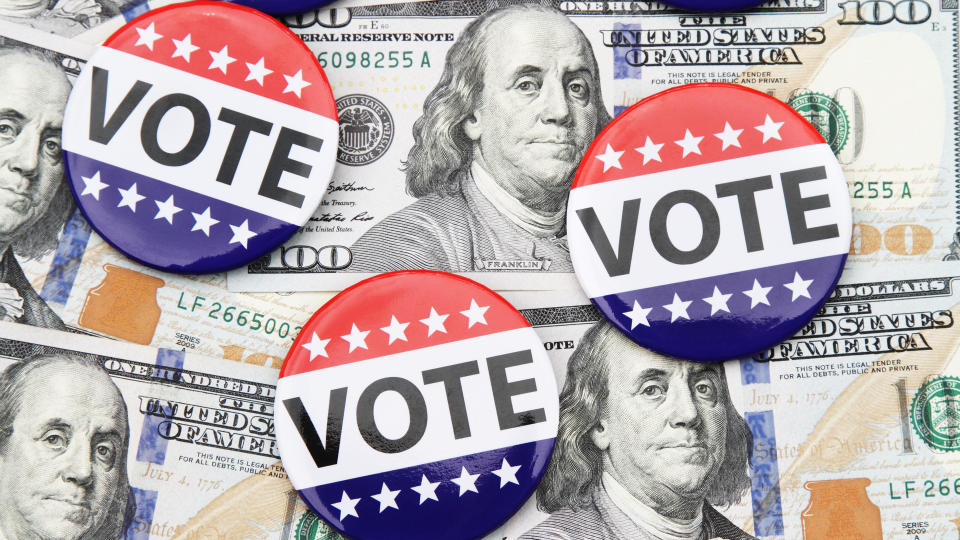I’m an Economist: Why I’m Optimistic No Matter Who Becomes President

The 2024 presidential election is shaping up to be a historic one, from the assassination attempt on former President Trump to the Democratic Party’s major news that President Joe Biden would be stepping down from his campaign to retake the White House. Americans are on edge as they watch the candidates — Trump and presumptive nominee Vice President Kamala Harris — vie for a chance to win their vote, with many worried that the outcome for either would spell doom for their finances.
Learn More: Trump Wants To Eliminate Income Taxes: Here’s What That Would Mean for the Economy and Your Wallet
Check Out: 6 Subtly Genius Things All Wealthy People Do With Their Money
However, there are a few watching the campaign trail of both the Republicans and the Democrats who are not worried about one candidate winning over the other. Some economists are actually feeling optimistic about what would happen with either Trump or Harris in office at the start of 2025.
Are you an American voter struggling to look on the sunny side of the election, especially if you are feeling the financial anxiety of just trying to make ends meet? GOBankingRates spoke with two economists for their reasons to feel at peace with whoever wins — at least when it comes to the economy.
Wealthy people know the best money secrets. Learn how to copy them.
The Election’s Impact Is Limited
“We are entering an economic regime where global growth is likely to remain sluggish and the cost of capital elevated,” said Dan Kim, an investment analyst and portfolio manager at Saturna Capital. “While inflation and interest rates remain important, their impact is expected to diminish over the next several quarters as the significant tail risks associated with them have been largely mitigated.”
Jeff Greger, a designer of systematic improvements for the financial well-being of families, added, “While there are plenty of possible real economic effects from the election, many stars would have to align for either presidential candidate to enact their economic platforms.
“While it seems presidents hold great sway over the economic fortunes of the country, they’re more likely claiming credit — or taking the blame — for the state of unemployment, the S&P 500, inflation or extreme weather,” Greger explained.
Read Next: I’m an Investor: I’m Making These Money Moves Immediately If Trump Wins
The President’s Policies Are One Factor Among Many
“Last year, I would describe the Fed’s policy actions as defusing a bomb, where even a minor error could have catastrophic consequences,” Kim said. “This year, the challenge is more akin to parking a boat in a narrow slip on a rainy day: There may be bumps and collisions — economic weakness, sticky inflation — but likely nothing that will sink the ship.”
The Fed Rate
Kim believes that Jerome Powell will likely continue to “bounce between hawkish and dovish tones based on the prevailing risks at any given time, until the U.S. economy achieves some form of ‘landing.'”
“The actions of a politically independent Federal Reserve are likely to have some of the greatest effects on consumer pocketbooks in coming months. A combination of Fed rate increases and an end to [COVID-19] pandemic-era supply chain disruptions, inflation is coming back to normal rates — even if prices still feel high to consumers,” Greger said.
“Due to this normalization, the Fed may finally lower rates later this year, which would lead to lower mortgage, credit card and auto loan rates. You’ll likely see the interest you make on your savings account go down, though,” Greger said, noting that business borrowing and spending could also increase.
“In this environment — slow growth, elevated cost of capital = margin pressure — my focus is on companies that offer products and services specifically designed to help enterprises enhance operating profitability through productivity and cost efficiency gains,” said Kim.
Trade Policies
President Biden kept many of Trump’s immigration and trade policies in place, and it looks like Harris might follow suit in the event that she becomes president, not changing up the game plan with her recent announcement about running for office in lieu of Biden.
“With regard to trade, both candidates are in favor of severely restricting imports from China. Biden maintained the Trump administration’s tariffs on China and recently announced a steep increase to tariffs on Chinese semiconductors, EVs and steel,” said Greger.
Greger highlighted that Trump is also campaigning on strict tariffs on Chinese imports.
“A trade war with China could raise prices Americans pay for the $536.3 billion worth of goods we import from them [as of 2022], but is unlikely to mean a significant uptick in domestic manufacturing,” said Greger.
Kim pointed out recent innovations — specifically in AI, digital transformation and accelerated computing — that could drive the economy over the next years. “Given this backdrop, I maintain a generally constructive outlook on equities for the remainder of 2024 and beyond, particularly for investors who adopt an active approach in their portfolios.”
The Economy Is Adaptable
The backbone of the United States economy comes down to its ability to be adaptable on both the domestic and global markets, regardless of who is running the country. Presidents come and go, influencing economic policies, trends and outcomes for the duration of their time in office, but it is not common for one POTUS to reshape long-term growth potential in the economy.
Much larger factors of economic influence come down to the ever-changing global trade relationships, advancements in technology and trends in demographics across the world.
Editor’s note on election coverage: GOBankingRates is nonpartisan and strives to cover all aspects of the economy objectively and present balanced reports on politically focused finance stories. You can find more coverage of this topic on GOBankingRates.com.
More From GOBankingRates
This article originally appeared on GOBankingRates.com: I’m an Economist: Why I’m Optimistic No Matter Who Becomes President